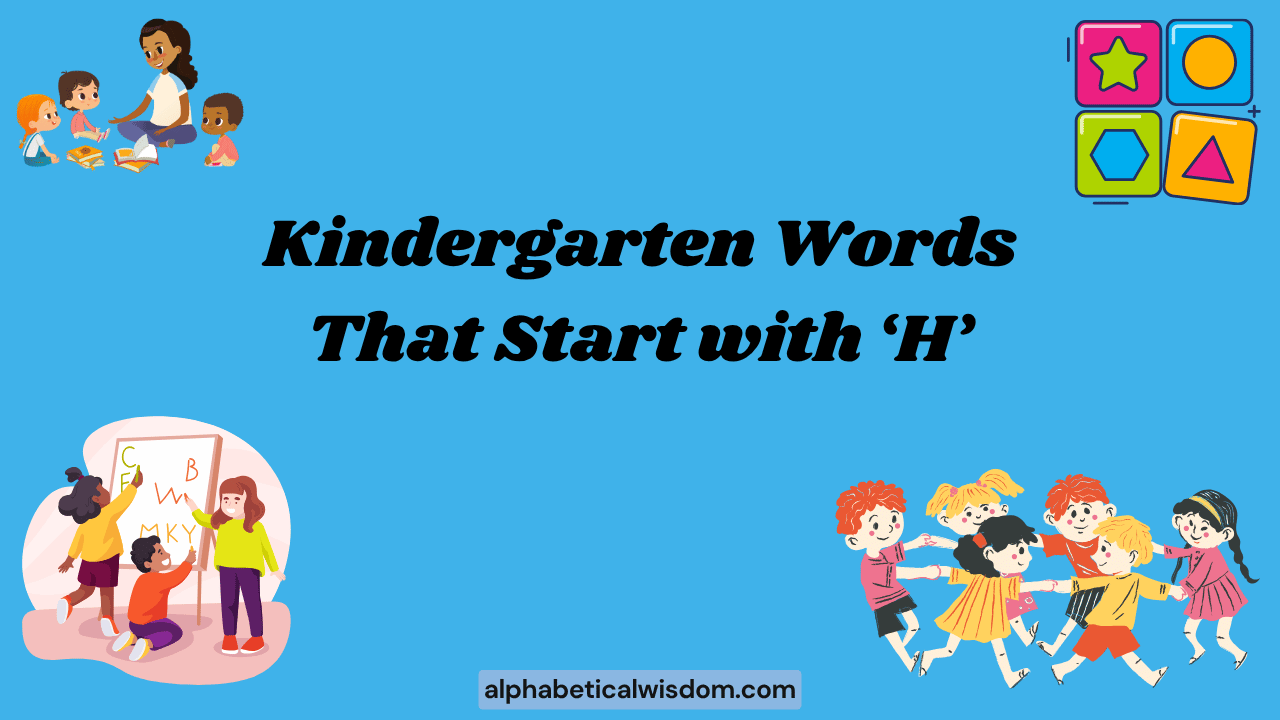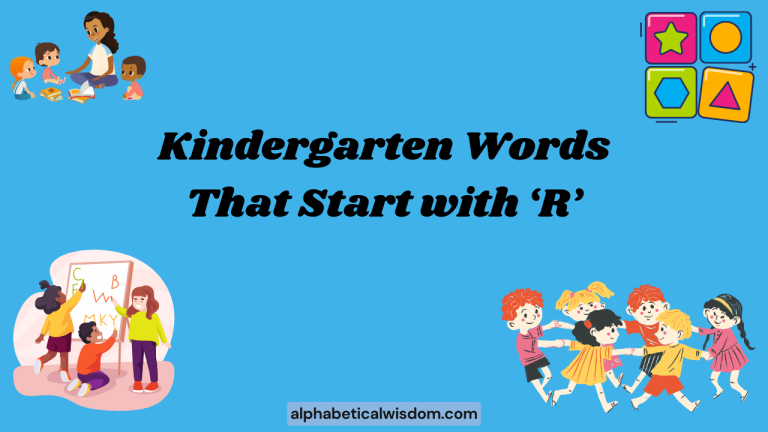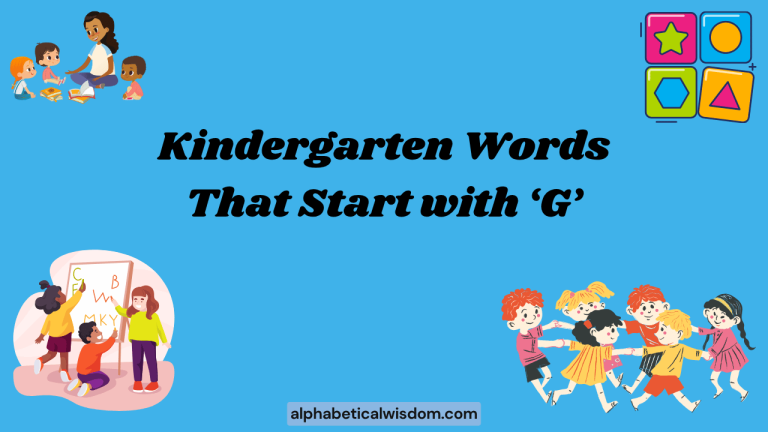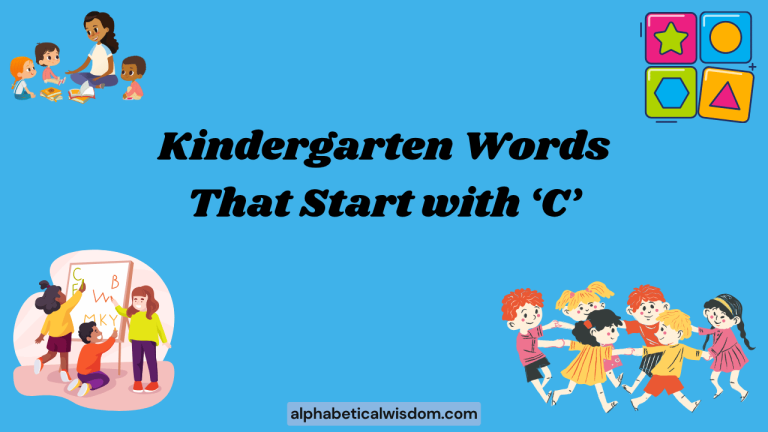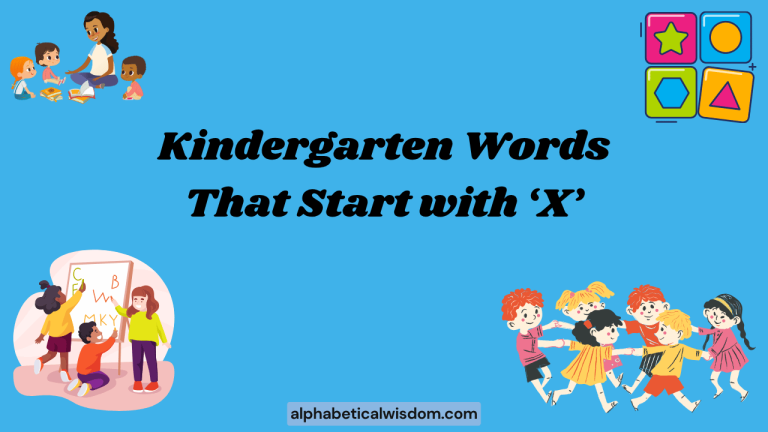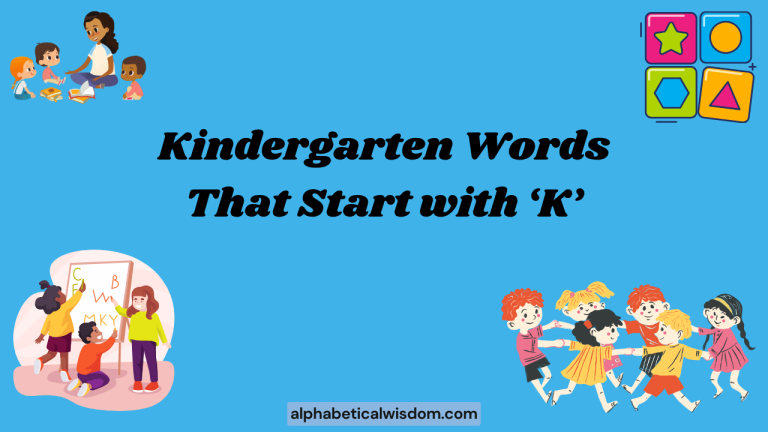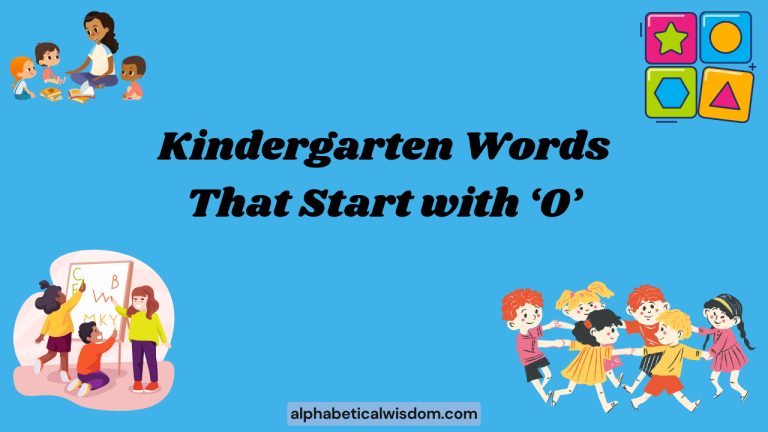Kindergarten Words That Start With H: A Comprehensive Guide
Understanding words that begin with the letter ‘H’ is a foundational step in a child’s literacy journey. This article provides a comprehensive guide to these words, tailored for kindergarten students.
Mastering these words enhances vocabulary, improves reading skills, and builds a strong base for future language learning. This guide will benefit parents, teachers, and young learners alike, offering clear examples, practical exercises, and helpful tips for effective learning.
Table of Contents
- Introduction
- Definition of Kindergarten Words That Start With H
- Structural Breakdown of ‘H’ Words
- Types and Categories of ‘H’ Words
- Examples of Kindergarten ‘H’ Words
- Usage Rules for ‘H’ Words
- Common Mistakes with ‘H’ Words
- Practice Exercises
- Advanced Topics
- FAQ
- Conclusion
Definition of Kindergarten Words That Start With H
Kindergarten words that start with the letter ‘H’ are basic vocabulary items suitable for children aged 4-6 years old. These words are typically simple, concrete nouns, verbs, or adjectives that are part of a child’s everyday experience.
The primary function of introducing these words is to expand a child’s lexicon and improve their ability to communicate effectively. These words often appear in early reading materials and are crucial for developing reading comprehension skills.
These words serve as building blocks for sentence construction and storytelling. The contexts in which these words are used are varied, ranging from describing animals (e.g., horse, hen) to naming household objects (e.g., house, hat) and expressing emotions (e.g., happy). Understanding these words helps children grasp fundamental concepts and interact more confidently with their environment.
Structural Breakdown of ‘H’ Words
The structural breakdown of ‘H’ words involves understanding the phonetic sound that ‘H’ represents and how it combines with other letters to form words. The letter ‘H’ usually represents a voiceless glottal fricative, meaning the sound is produced by air passing through the vocal cords without vibration.
This sound is often combined with vowels and consonants to create a wide range of words.
Many ‘H’ words follow simple consonant-vowel-consonant (CVC) patterns, such as hat or hen. Other words might include consonant blends, such as hand or help. Understanding these patterns helps children decode new words and improve their spelling abilities. It’s essential to teach children to recognize the ‘H’ sound at the beginning of words and to differentiate it from other similar sounds.
The letter ‘H’ can also be silent in some words, though this is less common in kindergarten-level vocabulary. Examples such as ‘hour’ or ‘honest’ are typically introduced later in a child’s education.
Focusing on words where the ‘H’ is pronounced clearly helps build a solid foundation for phonics.
Types and Categories of ‘H’ Words
Kindergarten ‘H’ words can be categorized into several groups based on their meaning and usage. These categories help children organize their vocabulary and understand the different contexts in which these words can be used.
Animals
This category includes words that name various animals, providing children with opportunities to learn about the animal kingdom. Examples include horse, hen, and hog.
Objects
This category consists of words that name common objects found in a child’s environment, such as house, hat, and hammer.
Actions
This category includes verbs that describe actions, such as hop, hug, and help. These words help children understand and describe different activities.
Feelings
This category includes words that describe emotions, such as happy, hungry, and hurt. These words help children express and understand their feelings.
People
This category includes words that refer to people, such as he, her, and him. These words are essential for understanding pronouns and sentence structure.
Examples of Kindergarten ‘H’ Words
To solidify understanding, let’s explore various examples of kindergarten ‘H’ words, categorized for clarity.
Animals
The following table provides examples of animals whose names start with the letter “H”. These words are commonly used in kindergarten to introduce children to the animal kingdom while expanding their vocabulary.
| Word | Example Sentence |
|---|---|
| Horse | The horse galloped across the field. |
| Hen | The hen laid an egg in the nest. |
| Hog | The hog rolled around in the mud. |
| Hamster | The hamster runs on its wheel. |
| Hawk | The hawk soared high in the sky. |
| Heron | The heron stood still by the water. |
| Hound | The hound followed the scent. |
| Hare | The hare hopped quickly away. |
| Hummingbird | The hummingbird sipped nectar from the flower. |
| Hippopotamus | The hippopotamus rested in the river. |
| Hedgehog | The hedgehog curled into a ball. |
| Hornet | The hornet buzzed around the hive. |
| Halibut | The chef cooked the halibut for dinner. |
| Haddock | We ate haddock and chips at the seaside. |
| Harvestman | The harvestman crawled along the wall. |
| Hermit Crab | The hermit crab found a new shell. |
| Harp Seal | The harp seal pup was adorable. |
| Hyena | The hyena laughed in the night. |
| Hookworm | The doctor warned about hookworm infections. |
| Honeybee | The honeybee collected nectar from the flowers. |
| Hoverfly | The hoverfly mimicked a bee. |
| Hake | The fisherman caught a large hake. |
| Howler Monkey | The howler monkey’s call echoed through the jungle. |
| Huntsman Spider | The huntsman spider scurried across the floor. |
| Hammerhead Shark | The diver saw a hammerhead shark. |
Objects
This table illustrates common objects whose names begin with the letter “H”. These words are essential for building a child’s understanding of their surroundings and expanding their vocabulary.
| Word | Example Sentence |
|---|---|
| House | I live in a small house. |
| Hat | I wear a hat to keep my head warm. |
| Hammer | My dad uses a hammer to build things. |
| Hand | I wash my hands before eating. |
| Head | I wear a hat on my head. |
| Heart | My heart beats fast when I run. |
| Hill | We walked up the hill. |
| Hole | There is a hole in my sock. |
| Hook | I hung my coat on the hook. |
| Horn | The car has a loud horn. |
| Hair | She has long brown hair. |
| Hall | The hall was decorated for the party. |
| Helmet | He wore a helmet while biking. |
| Hose | We used a hose to water the garden. |
| Hourglass | The hourglass measures time. |
| Hammock | I relaxed in the hammock. |
| Hanger | I hung my shirt on a hanger. |
| Harp | The musician played the harp. |
| Hatch | The hatch opened to reveal a secret passage. |
| Hearth | We sat by the warm hearth. |
| Hedge | The gardener trimmed the hedge. |
| Heel | My shoe has a high heel. |
| Hinge | The door swung open on its hinge. |
| Honeycomb | The bees made a honeycomb in the hive. |
| Horizon | We watched the sunset on the horizon. |
Actions
The following table lists actions or verbs that start with the letter “H”. These words help children describe activities and understand different actions.
| Word | Example Sentence |
|---|---|
| Hop | The frog can hop very high. |
| Hug | I hug my mom every day. |
| Help | I help my friend with his homework. |
| Hide | I like to hide during hide-and-seek. |
| Hold | I hold my teddy bear when I sleep. |
| Hear | I can hear the birds singing. |
| Hit | Don’t hit your brother. |
| Hunt | The lion likes to hunt for food. |
| Hang | I hang my coat on the hook. |
| Hail | It started to hail during the storm. |
| Hack | He used an axe to hack at the tree. |
| Haggle | They haggled over the price at the market. |
| Hallucinate | He started to hallucinate due to the fever. |
| Halt | The soldiers were ordered to halt. |
| Hamper | The rain hampered our plans for a picnic. |
| Handicap | The injury handicapped his ability to play sports. |
| Handle | Can you handle this heavy box? |
| Harangue | The politician harangued the crowd. |
| Harass | The bully harassed the younger children. |
| Harness | We need to harness the power of the sun. |
| Harrow | The farmer used a harrow to prepare the soil. |
| Harvest | The farmers harvest the crops in the fall. |
| Hasten | We need to hasten our pace to catch the train. |
| Hatch | The eggs will hatch in a few days. |
| Haunt | The ghost is said to haunt the old house. |
Feelings
This table showcases feelings and emotions that start with the letter “H”. These words help children express and understand their emotions and the emotions of others.
| Word | Example Sentence |
|---|---|
| Happy | I am happy when I play with my friends. |
| Hungry | I am hungry for lunch. |
| Hurt | I hurt my knee when I fell. |
| Hopeful | I am hopeful that I will do well on the test. |
| Honest | It is important to be honest. |
| Homesick | He felt homesick when he was away from his family. |
| Humorous | The movie was very humorous. |
| Haughty | The princess was haughty and arrogant. |
| Heartbroken | She was heartbroken after the breakup. |
| Hesitant | He was hesitant to speak his mind. |
| Horrified | She was horrified by the scary movie. |
| Humble | Despite his success, he remained humble. |
| Harmonious | The choir sang in harmonious voices. |
| Heated | The debate became heated and intense. |
| Heavenly | The dessert tasted heavenly. |
| Heroic | The firefighter performed a heroic rescue. |
| High-spirited | The children were high-spirited and playful. |
| Holistic | The doctor recommended a holistic approach to health. |
| Homely | The cottage had a homely and cozy atmosphere. |
| Hospitable | The hosts were very hospitable and welcoming. |
| Humanitarian | The organization provides humanitarian aid. |
| Humiliated | He felt humiliated after making the mistake. |
| Hypnotic | The music had a hypnotic effect. |
| Histrionic | Her reaction was overly histrionic. |
| Hysterical | She became hysterical with laughter. |
People
This table presents words related to people that start with the letter “H”. These words are crucial for understanding pronouns and describing individuals.
| Word | Example Sentence |
|---|---|
| He | He is my brother. |
| Her | I gave the book to her. |
| Him | I saw him at the park. |
| Husband | My mother’s husband is my father. |
| Host | The host welcomed us to the party. |
| Hairdresser | The hairdresser gave me a new haircut. |
| Hero | The firefighter is a hero. |
| Historian | The historian wrote a book about the past. |
| Heir | The prince is the heir to the throne. |
| Helper | The helper assisted with the project. |
| Hermit | The hermit lived in a secluded cave. |
| Healer | The healer used herbs to cure the sick. |
| Headmaster | The headmaster announced the school rules. |
| Hunter | The hunter tracked animals in the forest. |
| Housekeeper | The housekeeper cleaned the rooms. |
| Horticulturist | The horticulturist tended to the garden. |
| Human | Every human is unique. |
| Hypnotist | The hypnotist put the volunteer in a trance. |
| Hacker | The hacker tried to break into the system. |
| Handler | The dog handler trained the animals well. |
| Harbinger | The robin is a harbinger of spring. |
| Harmonist | The choir was filled with talented harmonists. |
| Hatter | The hatter made beautiful hats. |
| Hawker | The hawker sold goods on the street. |
| Hegemon | The country became the hegemon of the region. |
Usage Rules for ‘H’ Words
Understanding the usage rules for ‘H’ words is crucial for correct pronunciation and sentence construction. The primary rule is to pronounce the ‘H’ sound at the beginning of most words.
However, there are exceptions, such as in words borrowed from French (although these are less common in kindergarten vocabulary). Another important rule is to use articles (a/an/the) correctly before ‘H’ words based on the pronunciation of the following vowel sound, if any.
For example, we say “a hat” because ‘hat’ begins with a consonant sound, but we might say “an hour” (though ‘hour’ isn’t a kindergarten word) because the ‘h’ is silent and the word begins with a vowel sound. It’s also important to teach children the correct grammatical function of ‘H’ words, whether they are nouns (naming things), verbs (describing actions), or adjectives (describing qualities).
Furthermore, children need to learn the correct context in which to use each word. For example, ‘house’ refers to a building where people live, while ‘home’ refers to a place of comfort and belonging.
Teaching these nuances helps children develop a richer understanding of the language.
Common Mistakes with ‘H’ Words
One common mistake is mispronouncing the ‘H’ sound, either by omitting it or by exaggerating it. Another frequent error is confusing words that sound similar but have different meanings, such as “hear” and “here.” Children also sometimes struggle with the correct spelling of ‘H’ words, especially those with less common spelling patterns.
Another mistake is using the wrong article (a/an) before ‘H’ words, especially when they are unsure of the pronunciation. It’s essential to correct these mistakes early on to prevent them from becoming ingrained habits.
Providing clear examples and frequent practice exercises can help children overcome these challenges.
Here’s a table illustrating some common mistakes and their corrections:
| Incorrect | Correct | Explanation |
|---|---|---|
| “e” is a house. | “A” is a house. | Using the correct article before ‘house’. |
| I ear the bird. | I hear the bird. | Confusing “ear” and “hear.” |
| I am appy. | I am happy. | Misspelling “happy.” |
| The orse is big. | The horse is big. | Omitting the ‘h’ sound and letter in ‘horse.’ |
| I want to halp you. | I want to help you. | Misspelling ‘help’. |
Practice Exercises
Engaging in practice exercises is crucial for reinforcing learning and ensuring that children can confidently use ‘H’ words. These exercises should vary in difficulty to cater to different learning styles and paces.
Exercise 1: Fill in the Blanks
Complete the following sentences with the correct ‘H’ word from the word bank: hat, house, horse, help, happy.
- I wear a _______ on my head.
- I live in a _______.
- The _______ gallops very fast.
- Can you _______ me with my homework?
- I am _______ when I play with my friends.
Answers: 1. hat, 2. house, 3. horse, 4. help, 5. happy
Exercise 2: Matching
Match the ‘H’ word with its correct definition.
| Word | Definition |
|---|---|
| 1. Hen | A. A place where people live |
| 2. House | B. To give assistance |
| 3. Help | C. A female chicken |
Answers: 1-C, 2-A, 3-B
Exercise 3: True or False
Determine whether the following statements are true or false.
- A hat goes on your foot.
- A horse is an animal.
- Happy is a feeling.
- A house is where birds live.
- Help means to ignore someone in need.
Answers: 1. False, 2. True, 3. True, 4. False, 5. False
Exercise 4: Multiple Choice
Choose the correct ‘H’ word to complete the sentence.
- I can _______ the music. (a) see (b) hear (c) smell
- A _______ is used to hit a nail. (a) hammer (b) hat (c) hand
- Are you _______ today? (a) sad (b) happy (c) angry
Answers: 1. b, 2. a, 3. b
Exercise 5: Word Search
Find the following ‘H’ words in the word search puzzle: hat, hen, house, help, happy.
(A word search grid would be included here in a real HTML implementation, but is omitted for brevity)
Exercise 6: Sentence Construction
Create a sentence using each of the following ‘H’ words: hand, heart, hill, hole, hook.
- Hand: _________________________________________
- Heart: _________________________________________
- Hill: _________________________________________
- Hole: _________________________________________
- Hook: _________________________________________
Example Answers: 1. I hold the pen in my hand. 2. My heart beats fast when I run. 3. We climbed up the steep hill. 4. There is a hole in my sock. 5. I hung my coat on the hook.
Advanced Topics
For advanced learners, exploring more complex aspects of ‘H’ words can be beneficial. This includes understanding words with silent ‘H’ (e.g., hour, honest), which are exceptions to the general rule.
Additionally, learning about compound words that start with ‘H’ (e.g., houseboat, handshake) can further expand vocabulary.
Another advanced topic is exploring the etymology of ‘H’ words, tracing their origins and understanding how their meanings have evolved over time. This can provide a deeper appreciation for the richness and complexity of the English language.
Furthermore, advanced learners can delve into idioms and expressions that use ‘H’ words (e.g., “hit the hay,” “hold your horses”). Understanding these idiomatic expressions can improve fluency and comprehension.
FAQ
- Why is it important for kindergarteners to learn words that start with ‘H’?
Learning ‘H’ words is crucial for building a strong foundation in reading and vocabulary. These words are often simple and concrete, making them easy for young children to understand and use. Mastering these words improves reading comprehension and communication skills.
- What are some strategies for teaching ‘H’ words to kindergarteners?
Effective strategies include using visual aids, flashcards, and interactive games. Repetition and reinforcement are key. Encourage children to use the words in sentences and stories. Make learning fun and engaging by incorporating activities that appeal to their interests.
- How can parents support their child’s learning of ‘H’ words at home?
Parents can read books with their child, pointing out words that start with ‘H’. They can also play word games and create opportunities for their child to use ‘H’ words in everyday conversations. Providing a supportive and encouraging environment is essential.
- What are some common challenges children face when learning ‘H’ words?
Common challenges include mispronunciation, spelling errors, and confusion with similar-sounding words. Some children may also struggle with the concept of silent ‘H’ in certain words (although this is less relevant for kindergarten vocabulary). Patience and consistent practice are key to overcoming these challenges.
- How can I make learning ‘H’ words fun and engaging for my child?
Use games, songs, and activities that incorporate ‘H’ words. Create flashcards with pictures and words. Encourage your child to draw pictures of ‘H’ words. Make up stories using as many ‘H’ words as possible. The more fun and engaging the learning process, the more likely your child is to succeed.
- Are there any online resources that can help my child learn ‘H’ words?
Yes, there are many online resources available, including educational websites, apps, and videos. Look for resources that are specifically designed for kindergarteners and that focus on phonics and vocabulary development. Ensure that the resources are age-appropriate and align with your child’s learning style.
- How do I correct my child when they make a mistake with an ‘H’ word?
Be gentle and encouraging. Correct the mistake in a positive and supportive manner. Provide clear examples and explanations. Avoid criticizing or making your child feel discouraged. Focus on helping them understand the correct pronunciation and usage of the word.
- What is the role of phonics in learning ‘H’ words?
Phonics plays a crucial role in learning ‘H’ words. Understanding the phonetic sound of ‘H’ and how it combines with other letters helps children decode new words and improve their spelling abilities. Phonics instruction should be systematic and explicit, focusing on the relationship between letters and sounds.
- Should I focus only on words that start with ‘H’ or should I teach other letters as well?
It’s important to have a balanced approach. While focusing on ‘H’ words is beneficial for targeted learning, it’s equally important to teach other letters and sounds. A comprehensive phonics program should cover all letters of the alphabet and their corresponding sounds.
- How can I assess my child’s progress in learning ‘H’ words?
Regularly assess your child’s knowledge through quizzes, games, and activities. Observe their ability to use ‘H’ words in conversations and stories. Track their progress over time and identify areas where they may need additional support. Celebrate their successes and encourage them to continue learning.
Conclusion
Mastering kindergarten words that begin with the letter ‘H’ is a fundamental step in a child’s early literacy development. By understanding the definition, structure, and usage of these words, children can build a strong foundation for future language learning.
Consistent practice, engaging activities, and parental support are essential for success.
Remember to focus on making learning fun and relevant to the child’s everyday experiences. Use visual aids, interactive games, and real-world examples to reinforce understanding.
Celebrate their progress and encourage them to continue exploring the wonderful world of words. With patience and dedication, children can confidently master ‘H’ words and unlock the power of language.
